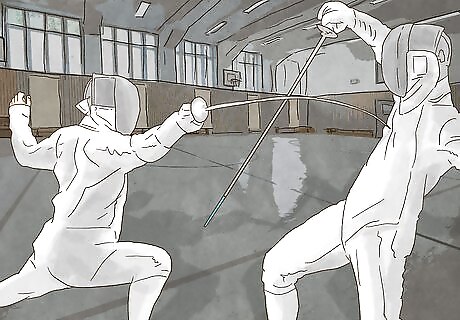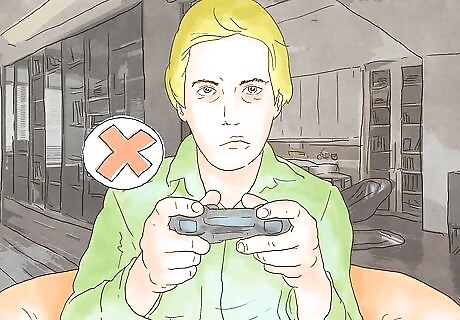
views
Improving Your Conversation Skills

Practice active listening. One of the best ways to be an engaging conversationalist is to focus on active listening, where you listen and respond to someone in a way that improves mutual understanding. Practicing active listening means viewing every conversation as a learning opportunity or as a way to get to know someone better. When you actively listen to someone, they can tell you are fully engaged in what they are saying. They will also be able to tell that you are ready to respond to their comments with energy and engagement, making your conversations less boring and meaningless. Practice active listening with a sympathetic friend. Allow the friend to talk to you about her day or her latest hobby and focus your attentions fully on her. Let her finish speaking without interrupting her, but nod, make eye contact, and smile to show you are engaged. Then, repeat what she said to you back to her in your own words. Phrase this with, “What I hear you saying is…” or “I think you mean…” Once she agrees that you have understood what she told you, you can then respond to what she told you and offer advice or a comment. This will show that you are interested in what she says and ready to respond to her thoughts. She can then feel it is appropriate to actively listen to you, leading to more fulfilling and clear conversations.

Ask complicated, rather than simple, get to know you questions. Often, it can be boring to ask simple, small talk questions like, “How old are you?” or “Where did you grow up?” when you first meet someone at a social event or a party. While it is important to show interest in someone's background or life, asking familiar questions can kill any interesting or meaningful conversation. Instead, think about more complicated or nuanced questions you can ask someone when you first meet them. This will show you are actually curious about someone and not just trying to be polite or make small talk. For example, you could ask someone you just met, “What's the most exciting thing you're working on right now?” or “How do you know the host?” Try to strike a balance between casual and engaged, where the person is interested enough in your question to respond to it. Avoid questions that can be answered with a “yes” or “no”. Go for open ended questions like “What was the highlight of your day today?” or “Working on anything exciting right now?” Skip right over the small talk questions and get to the more interesting stuff. Chances are your audience will appreciate not having to talk about where they're from originally or their age.

Respond to the listener's body language and level of attention. When you are talking to someone, steal a quick glance at her body language. Note if her body is facing you, with her hands relaxed and at her sides. Pay attention to her level of eye contact and if she encourages you to keep talking by nodding, smiling, and looking at you. If she has her arms crossed and responds to you by saying “Oh, that's really interesting” or “Really? I had no idea” while avoiding eye contact with you, she may not be very interested in what you are saying and you may be boring her. If you notice her body language is closed and she does not seem engaged, you may want to shift the direction of the conversation. Throw in an engaging question, like “What was the highlight of your day?” or “What's your story?” Shift gears by telling a story about the host of the party or a brief, funny joke. You can also fall back on safe topics of conversation, like the latest television shows or the latest movies everyone is talking about. Avoid bringing up religion, money, and politics, unless you are truly at a loss for how to save a boring conversation and want to rely on these taboo topics as a last resort.

Tell a funny story. Liven up a dull conversation with a funny story and tell it with energy and engagement. Introduce the story by relating it to something someone just said or to a train of thought that you are discussing with a group of people. You can introduce it by saying “You know, that reminds me of the time…” or “It's funny you should mention that, something crazy happened to me the other day…” Keep the story brief and get to the first laugh quick, within the first thirty seconds of telling the story. If you can't get to the laugh in the first thirty seconds, try to keep the first thirty seconds as entertaining as possible. Use your hands to gesture and act out the story and maintain eye contact with the other person or with the group as you tell the story. Be confident and avoid long pauses or tripping over your words. Try to end the story on the biggest laugh so everyone is entertained and engaged. It's okay if you don't get a big laugh. Even a chuckle or a shake of the head and a smile will be a sign that your audience is interested in the story and not bored with what you had to say.

Consider joining a Toastmaster's club to improve your speaking abilities. If you'd like more practice engaging strangers in conversation and telling entertaining stories and anecdotes, you may consider joining your local Toastmaster's club. Toastmaster's is a non profit organization that helps members build leadership skills and public speaking skills. As a member, you will have to write and present talks on a variety of subjects to a room of other members. You will also get feedback on your public speaking abilities and learn other ways to be comfortable in a social setting. A list of Toastmaster's by country and state can be found on the Toastmaster's website: https://www.toastmasters.org/Find-a-Club.
Doing New and Fun Things

Take up a new hobby. Think about a hobby you've always wanted to try or pursue or any hobbies you've always wanted to focus on. Sign up for a class that will help you get better at the hobby, like a class in painting, pottery, woodworking, or a musical instrument. Pick a hobby you think you will enjoy learning more about and that will force you to get out of your comfort zone. If you need more motivation to pursue this hobby, enlist the support of a friend or a partner. Take the class together or ask the person to remind you about the class every week. Having someone as a support will keep you focused on the new hobby and commit to learning new skills.

Join a club or a recreational team. Think about a sport or a recreational activity you've always wanted to try like fencing, volleyball, weight lifting, or swimming. Or, consider a sport you've always been good at, but have not had time to focus on. Choose a club or a recreational team in your area and show up for practice every week. Put time in your schedule to ensure you make each practice or training session and make it a priority. Participating in a sport or joining a team will also give you more opportunities to socialize with new people and be part of a new group. You can then practice your conversation skills and improve your ability to be engaging and entertaining around others.

Avoid isolating activities. Maybe you tend to spend your Friday nights watching movies online or playing video games alone. While everyone needs some alone time to chill out and relax, always doing these activities on your own could lead to isolation and boredom. Rather than do these activities solo, try to share them with your friends, family, or new people. Invite friends over for a movie watching party or have a video game night with family. Try to integrate others into activities you usually do alone. Change up your routine so you are not always spending time alone or staying within your comfort zone. Focus on activities that force you to be around others and to practice interacting with others on a daily basis. This will allow you to get comfortable with talking to others and to create relationships that keeps your life interesting and exciting.

Add a fun twist to everyday activities. Keep familiar activities from being boring or humdrum by adding a new or fun twist to them. This will ensure you do not get bored with your routine and you are always seeking out new and fun ways to do everyday things. If you tend to sit at home and write or read on your couch, shift your routine by going to a cafe to write or read. If you take a morning jog on the same route every time, take a detour or a new path. If you listen to the same music on your morning commute, mix it up and listen to a new mix or ask friends for new music.

Create a bucket list. A bucket list is a list of activities that you have always wanted to do or plan to do. Your bucket list can contain dream items like “travel the world” or it could contain more practical items like “learn how to play drums” or “ask my boss for a raise”. Make a bucket list that contains practical items and dream items so you have at least one item you feel you can achieve a week. You can then set personal goals, within a time frame, so you can work to achieve these bucket list items. Track how many items you achieve over a reasonable amount of time and cross them off the list. Add more items every time you mark one off so you can feel you are continually doing new and interesting things. If you cannot decide what to check off your bucket list, you can use random selection to your advantage and choose an item at random. This will keep the ritual of choosing a bucket list item exciting and interesting. Keep the dream items as aspirations and don't be afraid to dream big. These dream items could push you to actually achieve seemingly impossible things, especially if you are looking to do new and fun activities more often.
Adopting a Spontaneous Attitude

Release any limiting beliefs or ideas you may have. Part of why you may feel you are a bore is that you feel you cannot talk to strangers or you are not capable of doing new or challenging things. You may have picked up limiting beliefs or ideas that are holding you back. It's important that you identify these beliefs and focus on chipping away at them so you do not feel limited or constrained by these beliefs. A good way to approach a possibly new or challenging situation is with curiosity, rather than with fear. Think about how a child sees the world and expresses a genuine desire to learn about the things she does not know or understand. Try to embrace this childlike approach to the world, and be open to spontaneous experiences. This may help you to release any limiting ideas that you tend to lean on or use as an excuse not to do something new.

Focus on saying “yes” instead of “no”. Another big element of spontaneous living is saying “yes” instead of “no” to situations or activities that make you uncomfortable. This could be something small, like going to a party that you normally wouldn't go to or attending a talk that you would usually skip out on. Focus on stepping out of your comfort zone and embracing uncomfortable situations. Challenge yourself to say “yes” to at least one event, activity, or situation a week that you would usually say “no” to. This could be a friend's invitation to a talk or a play, an opportunity to try a new food, or a chance to do something you are very uncomfortable doing, like singing or dancing. The more you say “yes”, the less bored with your life you will feel and the less boring you will be in everyday conversation.

Distance yourself from any negative or boring influences. If you have a friend or relative who tends to bring the energy in the room down or who you find boring, keep some distance from them. Often, you can pick up the habits of others, especially if you spend lots of time with them on a daily basis. Rather than let yourself get sucked in to a boring or negative outlook, focus on being more spontaneous and ready to embrace new or exciting things.

Embrace random decision making. Though not everything should be done through random decision making, especially big decisions involving money or relationships, you can keep small decisions interesting with a dash of randomness. For example, if you want to take a walk in your area but aren't sure where to go, flip a coin and go where the coin leads. If you aren't sure what movie or show to watch, close your eyes and choose a show at random.
















Comments
0 comment